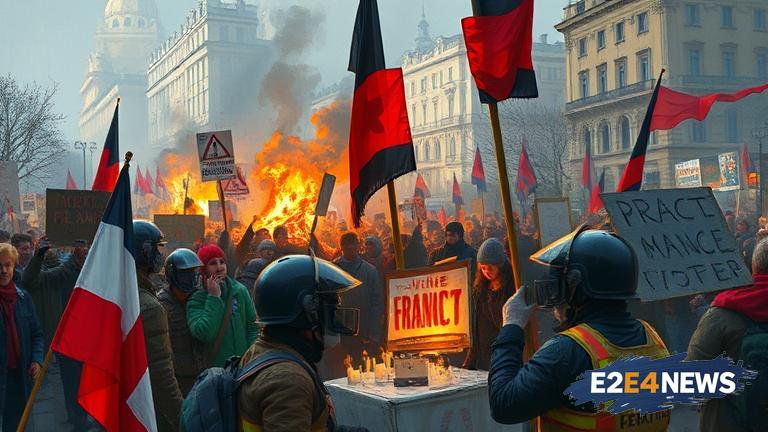The French government is facing a major crisis as strikes and protests are set to erupt across the country. The unrest is being driven by a range of issues, including pension reform, job insecurity, and a growing sense of discontent among workers and citizens. The government’s plans to raise the retirement age and cut pensions have sparked widespread outrage, with many seeing the moves as an attack on the country’s social safety net. The strikes and protests are being organized by a coalition of trade unions and activist groups, who are demanding that the government reverse its plans and prioritize the needs of workers and citizens. The movement has already gained significant momentum, with thousands of people taking to the streets in recent days to voice their opposition to the government’s policies. The protests have been marked by clashes between police and demonstrators, with reports of tear gas and baton charges being used to disperse crowds. Despite the violence, the movement shows no signs of slowing down, with more strikes and protests planned in the coming days. The French government is facing a major crisis of legitimacy, with many questioning its ability to respond to the needs of workers and citizens. The country’s economy is also starting to feel the effects of the unrest, with businesses and industries being disrupted by the strikes and protests. The government has attempted to respond to the crisis by offering concessions and compromises, but so far these have been rejected by the unions and activist groups. The situation is being closely watched by other European countries, who are concerned about the potential for the unrest to spread. The French government’s handling of the crisis is being seen as a test of its ability to manage the country’s social and economic problems. The strikes and protests are also having a major impact on the country’s transport network, with flights, trains, and buses being disrupted or cancelled. The government has been accused of using heavy-handed tactics to suppress the protests, with reports of police brutality and intimidation being used to silence demonstrators. Despite the challenges, the movement remains determined and defiant, with many seeing the strikes and protests as a necessary response to the government’s policies. The French government is facing a major challenge to its authority, with the strikes and protests threatening to bring the country to a standstill. The situation is being closely watched by the international community, who are concerned about the potential for the unrest to spread to other countries. The French government’s response to the crisis will be crucial in determining the outcome of the strikes and protests, with many calling for a more conciliatory approach to be taken. The country’s president has been accused of being out of touch with the needs and concerns of workers and citizens, and the government’s handling of the crisis is being seen as a major test of its legitimacy. The strikes and protests are also having a major impact on the country’s education system, with schools and universities being closed or disrupted. The government has been accused of using the crisis to push through its own agenda, with many seeing the strikes and protests as a convenient excuse to implement austerity measures and cut public services. The movement is being driven by a range of different groups and organizations, including trade unions, activist groups, and community organizations. The strikes and protests are also having a major impact on the country’s healthcare system, with hospitals and medical services being disrupted or closed. The government has been accused of prioritizing the needs of corporations and wealthy elites over those of workers and citizens, and the strikes and protests are being seen as a response to this perceived injustice.




